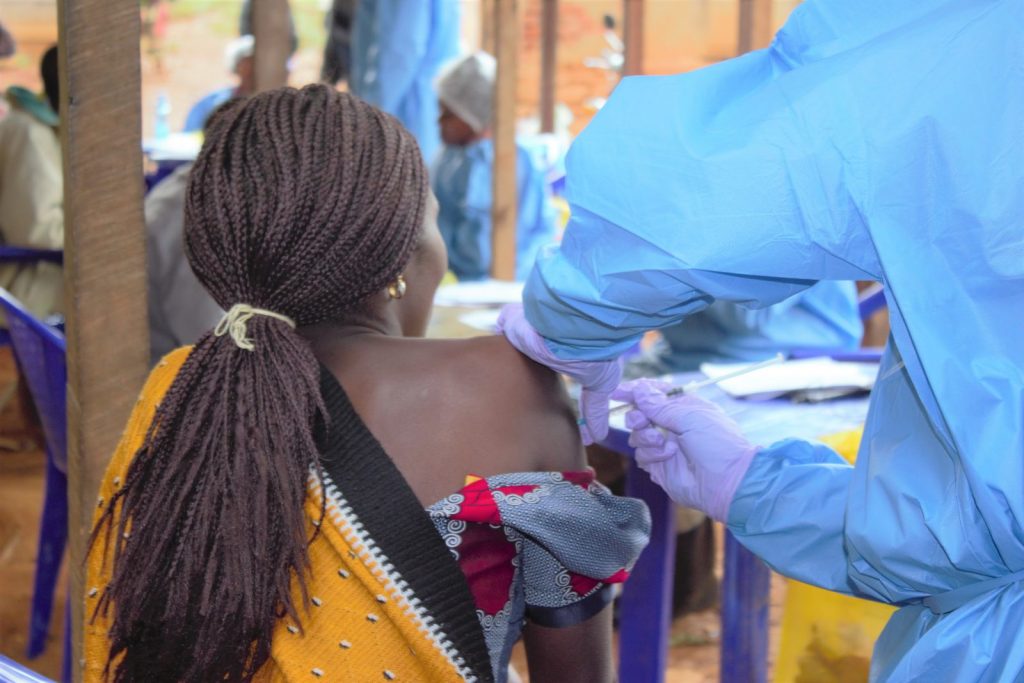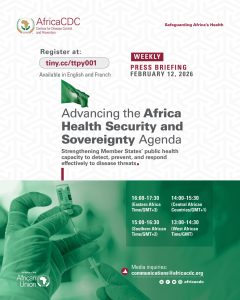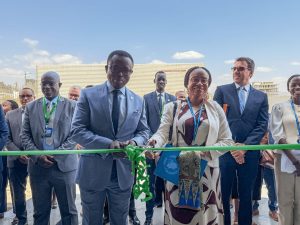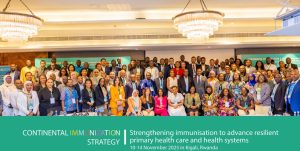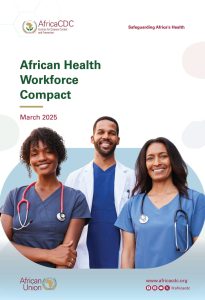Addis Ababa, 23 September 2021— The Africa Centres for Disease Control and Prevention (Africa CDC), the International Federation of Red Cross and Red Crescent Societies (IFRC) and the United States Mission to the African Union (USAU) called on partners and governments to do more to end vaccine inequity.
This call was made today, during a high-level event entitled “Saving Lives, Saving Livelihoods: Achieving high-level, equitable, COVID-19 vaccine coverage in African Union (AU) Member States”, aimed to follow-up the Global COVID-19 summit convened by U.S. President Joseph R. Biden on September 22 with local African partners on the margins of the United Nations General Assembly (UNGA).
Much of the population of Africa is being left behind, even as other parts of the world begin their path to recovery from this deadly pandemic. The deep inequities in vaccine distribution are also linked to the devastating socio-economic impacts of COVID-19. According to a report released in April 2021, economic disruption is likely to persist in Africa due to COVID-19 restrictions—and the slow pace of vaccine rollouts. Worryingly, Africa has been facing multiple, chronic crises, including poverty and food insecurity, which have been exacerbated by COVID-19.
Africa CDC, IFRC and USAU warned that, in addition to slow vaccine rollouts, the presence of several crises, including COVID-19, in many African countries, is resulting in the continued loss of lives and livelihoods. The three institutions also indicated that having the vaccine doses alone won’t be enough.
“As we call for the end of vaccine equity, we know that the work doesn’t end there. We also need to be able to deliver those vaccines to the communities; ensure that people are prepared to be vaccinated and that the doses are being delivered where they are needed. It is crucial to continue working more closely with communities.” Dr John Nkengasong, Director of Africa CDC emphasized.
The response to COVID-19 has been made more complex by decreasing perceptions of risk, pandemic fatigue, vaccine hesitancy and mistrust of authorities. The IFRC and member National Societies have been tackling the spread of misinformation by providing educational materials, running radio campaigns and information hotlines for the community.
Nena Stoiljkovic, IFRC’s Under Secretary General for Global Relations, Humanitarian Diplomacy and Digitalization—who joined the high-level summit on COVID-19 from Addis Ababa—said: “More than ever, the pandemic is testing our ability to tackle multiple, mutually exacerbating crises concurrently. COVID-19 has plunged thousands of African families into poverty and exacerbated the vulnerabilities of those already facing multiple threats before this pandemic hit. To minimize its socioeconomic impacts, which will be felt for many years to come, we must tackle the pandemic more aggressively. This means more equitable access to vaccines as a priority. It also means investing in local actors, such as National Red Cross Red Crescent Societies, who have been on the frontlines of this crisis since this outset, building community trust and resilience for the future.”
The three institutions reiterated the need to do more to bring the pandemic to an end, while preparing to respond to future crises.
U.S. Ambassador to the AU, Jessye Lapenn said, “We [the United States] are working with our international partners, investment entities, pharmaceutical companies, and other manufacturers to create the kind of global vaccine production and manufacturing capacity and capabilities that will help the world beat this pandemic and prepare us to respond to future threats”
With increasing concerns that the secondary impacts of COVID-19 could have long-lasting affects across Africa, particularly for those living in poverty, IFRC is increasing its focus on livelihood support, particularly through cash-transfer programming where appropriate. But the humanitarian organisation warned that the COVID-19 pandemic could not be defeated unless more vaccine doses reached the arms of the most vulnerable on the continent.
H.E. Ellen Johnson-Sirleaf, former President of the Republic of Liberia, delivered a keynote address during the COVID-19 Summit today. She said: “Vaccine inequity is putting many lives and livelihood in danger. There has been a lot of talking, but now we must see these words turned into action. We call upon governments, partners and vaccine manufacturers to pull out all the stops to ensure that everyone has access to COVID-19 vaccines without any further delay.”
…END…
For Media inquiries:
Africa CDC:
Dr Herilinda Temba (CHWs Program): HerilindaT@africa-union.org
Gweh, Nekerwon (Communication & Media Engagement) GwehN@africa-union.org
Chrys P. Kaniki (Media Engagement): KanikiC@africa-union.org
IFRC:
In Addis: Betelehem Tsedeke | +251 935 987 286 | Betelehem.tsedeke@ifrc.org
In Nairobi: Euloge Ishimwe |+254 731 688 613 | euloge.ishimwe@ifrc.org
In Geneva: Teresa Goncalves | +44 7891 857 056 | teresa.goncalves@ifrc.org
USAU : Kelly McCaleb | +251-93-742-9668 | McCalebKR@state.gov
About Africa CDC
Africa CDC is a specialized technical institution of the African Union which supports Member States in their efforts to strengthen health systems and improve surveillance, emergency response, prevention and control of diseases.
Learn more at: https://africacdc.org
About IFRC
IFRC is the world’s largest humanitarian network, comprising 192 National Red Cross and Red Crescent Societies working to save lives and promote dignity around the world.www.ifrc.org – Facebook – Twitter – YouTube
About USAU
The goal of the United States Mission to the African Union (USAU) is to partner with the African Union in ways that will strengthen democratic institutions, promote peace and stability, support sustainable economic development through increased trade and investment, and improve the lives and health of all Africans. https://www.usau.usmission.gov/
Download: Africa CDC, IFRC, and USAU call for Equitable Vaccine Coverage in Africa

